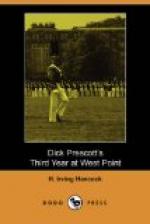Haynes remained for some moments where he was, gazing after Dick with a curious, leering look.
“Prescott is a coward—–that’s what he is!” muttered the turnback. “If he weren’t, I said enough to him just now to cause him to leap at my throat. Humph! Anyone can beat a coward, and without credit. Prescott, your days at the Military Academy are numbered! You, an Army officer? Humph!”
Though it would be hard to understand why, Haynes felt much better after that brief interview. Perhaps it was because, all along, he had feared Cadet Prescott. Now the turnback no longer feared his enemy in the corps.
How would the feud end? How could it end?
CHAPTER XIX
THE TRAITOR OF THE RIDING HALL
If Dick gave no further outward attention to Haynes, he was nevertheless bothered about the fellow.
“Haynes isn’t fit to go through and become an officer; to be set up over other men,” Prescott told himself often.
This slighting opinion was not on account of the personal dislike that Prescott felt for the turnback. There were other cadets at West Point whom Dick did not exactly like, yet he respected the others, for they themselves respected the traditions of honor and justice that are a part of West Point.
With Haynes the trouble was that he was certain, sooner or later, to prove a discredit to the best traditions of the Army. Such a fellow was likely to prove a bully over enlisted men. Now, the enlisted men of the Regular Army do not resent having a strict officer set above them, but the officer must be a man whom they can respect. Such an officer, who commands the respect and admiration of the enlisted men under him, can lead them into the most dangerous places. They will follow as a matter of course; but an unworthy officer, one whom the enlisted men know to be unfit to command them, will demoralize a company, a troop, a battery or a regiment if he be given power enough.
Every cadet and every officer of the Army is concerned with the honor of that Army. If he knows that an unworthy man is obtaining command, it worries the cadet or officer of honor.
Had he been able to offer legal, convincing proof of Haynes’s dastardly conduct in pushing him off the train on the return from the Army-Navy game, Prescott would have submitted that proof to the authorities, or else to the members of the second class in class meeting.
“But Haynes would only lie out of it, of course,” Dick concluded. “As a cadet, his word would have to be accepted as being as good as mine. So nothing would come of the charges.”
A class meeting, unlike a court-martial, might not stand out for legal evidence, if the moral presumption of guilt were strong enough; but Cadet Prescott would not dream of invoking class action unless he had the most convincing proof to offer.




